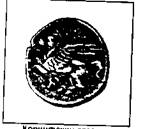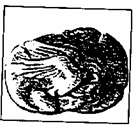home
 Economy Economy
 books books
 The history of the world economy - Polyak GB The history of the world economy - Polyak GB
|
The history of the world economy - Polyak GB
money relations
At the turn of II-I thousand. BC. e. due to the predominance of subsistence farming and poor development of the money trade as such was not, their role is performed mainly cattle. In the era of colonization as money all the metal bars are used most often, bars, and finally, about the turn of the VII-VI centuries. BC. e. It begins coinage. By VI. BC. e. In Greece there were two main monetary system - Aegina and Evoikos *. The basis of each system was talent - weight unit that in Euboea was 26.2 kg, and in Aegina - 37 kg. From one talent minted 6 thousand drachmas -. Silver coins. Aegina standard was extended to most parts of Greece and the Aegean Islands, Evoikos - on the island of Euboea, in many western Greek colonies, as well as in the two largest polis - Corinth and Athens.
* From Aegina and Euboea Island names - important commercial centers of the Aegean Sea.

Corinthian stater (c. 320 BC. E.)

Tetradrachm of Tarsus (323 BC. E.)
In the archaic period, along with the monetary circulation developed usury and insolvent debtors, as a rule, paid in slaves and could even sell abroad.
The role of the state in economic life
The main feature of the Greek polis was attended by all members of the civil community in government, and this feature is largely determined by internal policies. In particular, in many Greek city-states had laws restricting the purchase and sale of land, and aimed at the protection of landed property of individual citizens. However, despite this, in most parts of Greece the development of commodity production and the shortage of land led to the growth of large estates, strengthening of social differentiation and the aggravation of the conflict between the aristocracy and the demos (people). In many city-archaic era of social and political conflicts often ended in the establishment of tyranny - a regime of personal power. In most cases, the tyrants have sought to enlist the support of the demos, cared about improving its position, contributed to the development of crafts and trade, improvement of cities. However, tyrants are constantly in need of money and the different ways they extorted from the population; after all, most policies tyranny was overthrown.
An important role in the further socio-political and economic development of Greece played the reforms carried out in the Archaic era. The most famous and interesting reforms in Athens and Sparta, most clearly represent the two main types of policy - trade, industrial and agricultural.
One of the greatest reformers of Athens - Solon - politician and poet, considered one of the seven Greek sages. In 594 BC. e. Solon was endowed with extraordinary powers and launched reforms aimed at restoring the unity of the civilian staff. First of all, he spent seysahteyyu (c shaking off the burden.): All debts, made on the security of land, and the interest accrued thereon were declared invalid. Bondage for debt was abolished, the Athenians debtor sold abroad were bought back by the state. Seysahteyya, as well as laws on land acquisition Ban over certain rules prevented the ruin of the peasants and contributed to the development in Attica mainly medium and small holdings. To facilitate the Athens trade with Asia Minor and the western part of the Mediterranean unification of weights and measures has been carried out previously prevailed Aegina monetary system was replaced by a lighter Evoikos. There were also taken steps to strengthen the marketability of agriculture: Encourage the development of horticultural crops, to allow the export of olive oil abroad. Much attention was also paid to the craft: in particular, it was found that if the father had not taught his son to any craft, he could not qualify for the old age filial support. In addition, the export of raw materials has been banned; Athens attracts foreign craftsmen, many metics, in charge of trade, was granted Athenian citizenship.
Important reforms of Solon indicates that achieving a high level of commodity-money relations in Athens VII-VI centuries. BC. E., It was the introduction of freedom of wills and replacing tribal privilege property: depending on the income of all citizens of the land had been divided into four categories.
In Sparta, the legendary legislator, laying the foundations of government, considered Lycurgus. Land in Sparta was actually public property holdings of individual families were inalienable, their number has changed only with the accession of new areas, in particular, with the conquest of Messenia - rich area in the southwest of the Peloponnese - the turn of the VII-VI centuries. BC. e. redistribution of land was carried out: the number of citizens of approximately nine thousand plots were allocated. Earth was treated Helots attached to it - the population of the conquered Spartans * Laconia and Messinia, turned into slaves of the state. Helots annually paid to the owner put on a fixed natural dues.
* The area in the south-eastern part of the Peloponnese, the center - Sparta.
Citizens of Sparta were considered in all equal to each other - and in everyday life and in the political and economic sphere. Lycurgus is credited with the establishment of a ban on the use of gold and silver coins, were allowed only extremely uncomfortable and bulky iron coins. The main occupation of the Spartans was military, trade and commerce was considered shameful for a citizen. These activities were provided periekam - deprived of their political rights, but personally free inhabitants of Laconia. Spartan system remained practically unchanged for several centuries (up to the IV. BC. E.) And led to the economic and cultural backwardness of this policy by others.


Comments
Commenting, keep in mind that the content and the tone of your messages can hurt the feelings of real people, show respect and tolerance to his interlocutors, even if you do not share their opinion, your behavior in terms of freedom of speech and anonymity offered by the Internet, is changing not only virtual, but real world. All comments are hidden from the index, spam control.